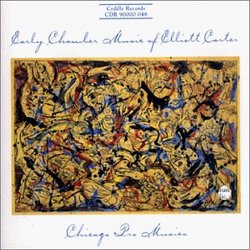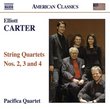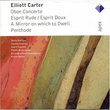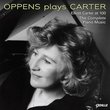| All Artists: Elliott Carter, Chicago Pro Musica, Barbara Haffner Title: Early Chamber Music of Elliott Carter Members Wishing: 1 Total Copies: 0 Label: Cedille Release Date: 11/19/1999 Genre: Classical Styles: Chamber Music, Historical Periods, Classical (c.1770-1830), Modern, 20th, & 21st Century, Instruments, Reeds & Winds, Strings Number of Discs: 1 SwapaCD Credits: 1 UPC: 675754078829 |
Search - Elliott Carter, Chicago Pro Musica, Barbara Haffner :: Early Chamber Music of Elliott Carter
 | Elliott Carter, Chicago Pro Musica, Barbara Haffner Early Chamber Music of Elliott Carter Genre: Classical
|
Larger Image |
CD DetailsSimilar CDs |
CD ReviewsCarter for Novices Christopher Forbes | Brooklyn,, NY | 05/25/2003 (5 out of 5 stars) "Whenever someone wants to scare away a conservative music lover, one of the sure ways to do it is to mention the name of Elliot Carter. Carter, the grand old man of 20th century American composition, has become synonymous with dense, atonal and highly academic East Coast American writing. But before Carter became, Carter the Forbidding, he was an American modernist in the Copland tradition. This beautifully performed CD illustrates some of the composer's first steps in the transition from populist (a jacket that never completely fit) to arch-modernist. It is a fascinating journey indeed. The earliest work on the disc is the Pastoral for Clarinet and Piano. This piece is lovely, though not particularly original. Basically tonal, the piece is a lyrical study for the clarinet, which is surrounded by some marvelous "bell" chords in the piano. The idiom is 1940s American populist, right out of Copland. The slightly older Copland really exerted a powerful influence on Carter, partly because of Copland's enormous popularity. But no matter how lovely the Pastoral is, it is obviously a derivative work and one that does not point to the mature mastery Carter would show in the 50s and 60s. The same could be said for the Woodwind Quintet. This is also a lovely two movement work, not particularly "Americana" in sound, but definitely showing the influence of Copland, Harris, Diamond and the like. The work is excellently crafted and thoroughly enjoyable, if not particularly original. You might think of it as the best Woodwind Quintet that Copland never wrote. The remaining works on the disc are something quite different. The most impressive is the justly famous Cello Sonata. This work is a marvel, completely modernist and without a trace of another composer. Though it is not atonal, it points that way, particularly in the stunning Moderato. It also introduces the first appearance of the justly famous "metric modulation" technique in Carter's rhythmic work. The first movement is a turbulent, brooding Moderato in a rhapsodic style. The second movement is more neoclassical in form, though with adventurous dissonant harmonies in the second theme. The third movement is the emotional heart of the work, brooding and intense. And the final movement is both a stunning conclusion and a wrap around, as it brings back material from the first movement, transformed, but still recognizable. This work is original Carter, bold, emotional, challenging, logically composed...it's perhaps the composer's first true masterpiece and one that I'll be returning to over and over again.The final work on the disc, the Eight Etudes and a Fantasy for Wind Quartet from 1950 had it's origins in a classroom assignment Carter had given students at Columbia University. Each of the Etudes tackles a different problem in composition and orchestration. In the process of tackling these problems you can hear Carter working out techniques that would come to artistic fruition later that year in the composition of the seminal First String Quartet. In the Etudes you can hear Carter experimenting with textures, tone color shifts, simple harmonic concepts wedded to difficult rhythms, simple melodic concepts wedded to complex textures and a final wedding of all techniques in the final fantasy, which begins in the manner of a fugue but ends up stretching that form to the breaking point. The work on the whole is quite interesting...though intellectually interesting, not emotionally. It must be taken as an academic study. I find the work is one that points toward other later pieces rather than being satisfying in it's own right. But it is a good work to hear nonetheless. The Chicago Pro Musica is a chamber group derived from members of the Chicago Symphony Orchestra. They play most all repertoire, but have a special penchant for 20th century music. It is obvious in these terrific performances. The Wind music is impeccably played. Particularly fine is the work of clarinetist John Bruce Yeh who plays with marvelous control and tone. Barbara Haffner is terrific in the Cello Sonata, almost the equal of Joel Krosnick, who is still my favorite cellist in this piece, but only by a nose. Easley Blackwood, a fine composer in his own stead, is terrific in the piano parts, creating a dense foil in the Cello Sonata. This is a CD for anyone interested in the career of Elliot Carter, but it is also a great one for those who imagine that Carter can only write dense and forbidding music. The Cello Sonata alone should show that Carter's dense music can be warm and inviting as well." Superb and committed playing scarecrow | Chicago, Illinois United States | 04/10/2000 (5 out of 5 stars) "The Chicago Pro Musica are Chicago Symphony players largely instigated and organized by clarinetist John Bruce Yeh. They commission new works as well as playing contemporary repertoire, an idea that never gets off the ground.(Abbado never did it,create a commissioning chamber group during his tenure in Berlin). Yeh is no stranger to contemporary music,he has played all the arduously difficult works involving the clarinet family all his career. He had played Carter's Clarinet Concerto in Chicago under Boulez. This is a nostalgic look back to early Carter, and we find the Eastern lyrical values, as in the Pastorale with Yeh. The Cello Sonata was one of Carter's early success, the other being the Piano Sonata. It points to the gruff lyrical power, the long lines and a penchant for adopting fascinating forms. The Cello and Piano are like two soloists going at it, there is a sense of accompaniment, but it engages more a sense of foreground and background. The sense of lyricism and expressionist gesture are prevalent as well. The Wind ensemble pieces here as well reveals Carter's penchant for interesting musical forms, like an etude on a single tone,shifting its timbre as the minimal means of development, or fugal ideas that involve the use of timbre rather than predetermined entrances."
|

 Track Listings (16) - Disc #1
Track Listings (16) - Disc #1

